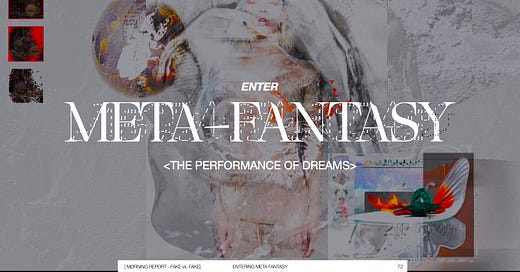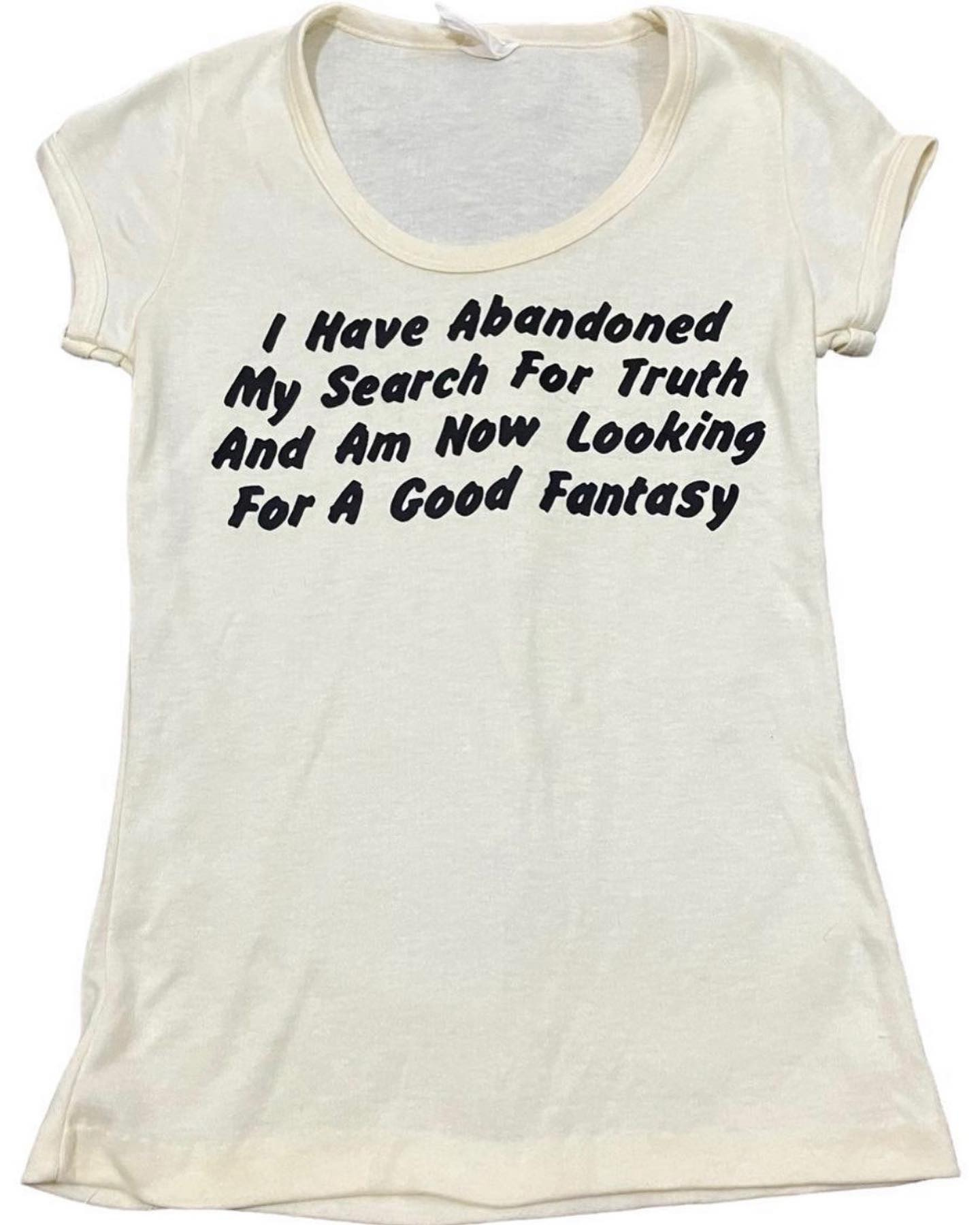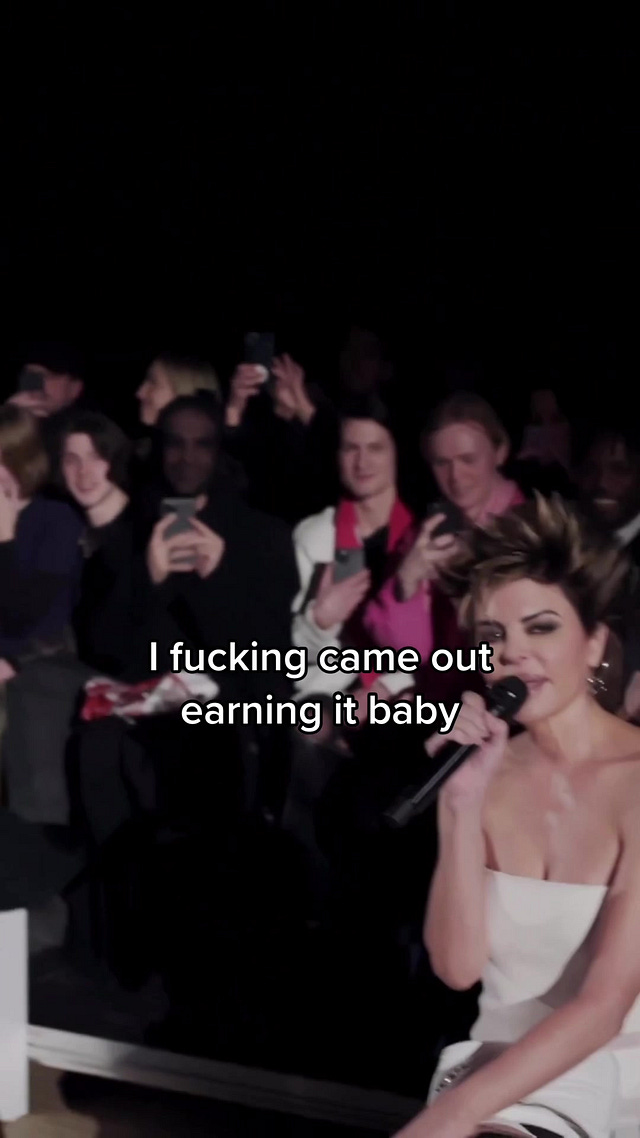MØRNING, the post-truth era has never felt more real fake (or is that fake real?). The spread of misinformation, ever-hostile censorship from social media companies, and clear bias of our technologies are a testament to this. There are many brave and brilliant people working to tackle fake news and navigate digital censorship to make critical voices heard, which we’ll be sharing very soon. In the meantime, MØRNING is praying for peace for everyone affected.
This week’s Burn After Reading isn’t about what’s happening on our burning planet, but how we’re responding to it. We’ve spent the past couple of years reckoning with collective existential crises, and nothing’s getting easier. But all signals seem to suggest that, even if the world remains just as difficult, the way we’re consuming and coping with it might be shifting. The time for irony and shitposting is over, and a new era of smart fantasy and surrealism is emerging. At MØRNING, we’ve coined this new attitude M͓̽e͓̽t͓̽a͓̽ ͓̽-F͓̽a͓̽n͓̽t͓̽a͓̽s͓̽y͓̽ (you’ll know this if you attended our trend report webinar last week), and we reckon it’s here to stay for a little while, defining the conversations we’re having, art we’re creating and content we’re consuming.
But what exactly is Meta-Fantasy? Read on for the full download from our Creative Director, Rhi.

Ever feel like we’re oscillating between two worlds? Walking down Broadway Market in jorts and a footy shirt, Sakura Grape vape in one hand and a matcha oat latte in the other - don’t you feel so fucking real? And then you flick open your phone and down the wormhole you go... Hello Pope in a puffer, hallowed Ozempic faces, deep fake Trump firing Fauci in a game of political football, the latest Kardashian scandal over who stole whose Dolce Vita lifestyle - am I drowning in a pool of fake?
With the rise of synthetic media – the veil on our reality has been #shifted. Nothing is real anymore. We have to fact-check the fact-checked. From Main Character Syndrome to NPCs, we’ve assiduously assimilated into the simulation.
Over the last decade the internet has shattered our dimensions of time and space, transcending from a digital mirror representing our real lives and journeying into a place of peak surrealism, one in which truth is decentralised and fakeness desensitised. To understand these absurd times, our Strategy Lead Shadeh created the Cycle of Communication; a framework to dissect the irrational behaviours we’ve adopted to adapt.
We passed through the Age of Authenticity, where our online selves were mediated by a desire to reflect the real world. Through a hazy Valencia filter the aim of the game was a polished and sanitised version of truth: a Performance of Reality.
Next, purpose manifestos and apology statements took over our feeds as society started to demand we hold ourselves accountable for our shortcomings. This was the Age of Sincerity, and with it, the Performance of Care.
More recently we’ve been in a stew of nihilism, exactly because that ‘care’ we just mentioned was so often performed and not acted on. No wonder shitposting, irony, sarcasm and absurdism have reigned supreme. This is the Age of Irony, and the Performance of Mistrust.
As we grapple with opposing worlds. our concept of Real and Fake have merged. We are on a journey towards transhumanism and reality has become Hyperreality. When everything we do is now mediated through the digital world, how can we ever #BeReal again?
In a direct response to the existentialism and collective nihilism we’ve been feeling, we’ve reached an inflection point in how we communicate, where the cycle of culture making and culture co-opting meant everything ended up either dystopian or frankly a little bit flat. Think Balenciaga models stomping through the mud or mid becoming the new mainstream.
But, as always, when the pendulum swings it must swing back the other way, signalling a moment of change, a cultural shift. With this comes a time to rebuild and rewrite our wrongs.
Enter: Meta Fantasy - the Performance of Dreams.
And here we have stage 4 of our cycle. We see a new dawn rising, one that embraces the relationship between human and machine. Where we break the fourth wall and are not only self-aware but self-referential.
Meta-Fantasy offers us a way out of the status quo doom loop, but not without first leaning in to what’s come before.
Meta = playing with familiar tropes, leaning into what's come before and referencing it (or yourself)
Fantasy = dreaming anew to break new ground
“We’re forsaking dystopia for purity, industry for new dreams, and Capitalist constraints for tender tech.” - Dagny Tepper, Creative Strategist at MØRNING and Founder of Pilot Magazine
We’ve been plotting Meta-Fantasy trends all year. See: the new genre of magical comfort content, the rise of spirituality in young people, our new obsession with horses, the boom in dupes, and in the infinite world of gaming, the increasingly experimental music industry, and beyond. Together, we’re testing the limits of our own realities, and finding new ones.
Who does it well?
Mugler’s AW23 show was a masterclass in Meta Fantasy, with Mugler of today referencing Mugler of yesterday. The clothes and the spirit redefined the catwalk, with 90s high camp pageantry blown wide open and iconic walkers from Ziwe to Arca. The show put the fantasy back in fashion, breaking the fourth wall by sending the epic cast down the runway with cameras for all to see. Creating a live commentary on viral content that became viral content itself!
How do we do it?
brand lore is the nucleus - Shumon Basar recently brought lore to the fore when he declared : “Lore is the new myth you make about yourself. You live inside these myths mythically”
Audiences crave something bigger and more mystical. An angel dies every time we try to resurrect ‘relatability’. For brands this means building your lore, owning it and developing it. This is not your brand history on a slide, it’s about creating an imaginative multiverse that your brand belongs to and playing out narratives that your audience can buy into. Let them put themselves into the plot and be part - a la Barbie dreamworld building.
Multiverse building is the gateway - Ana Andjelic, luxury specialist and author of ‘The Business of Aspiration’ calls this Interstitial storytelling, which “refers to a number of narrative bursts that are connected into a web of a wider story. A story is told as a series, with each piece of content containing germs of the next story and ending with a cliffhanger.”
Excavate the middle ground - Across all areas of culture, fashion, music and film we’re seeing huge cravings for real creative expression. For too long brands have fallen back on leaning on their community for the answers. Audiences are now craving the creative leadership of yesteryears. Have a POV or be gone
Being iconic is the instruction - Beyond her killer dance moves there's more we can learn from M3GAN - the horror film that quickly turned into viral rapture. While the creators could never have guessed the outcome they did intentionally create with iconic and memeable moments in mind. What iconic moments can you make for your brand?
Meta Fantasy represents a shift away from the sceptical and fragmented worldview of the post-Brexit-Trump era, a way out of dystopia towards a more engaged and hopeful approach. Fantasy enables us to break the cycle or cultural reflection and move towards culture making. Through subversion and provocation fantasy brings hope and entertainment - the ultimate tool for rebirth.
So, what do you think? We’d love to know if you’re feeling Meta-Fantastical. Drop us a comment below or, as always, catch us over on Instagram.
And if you really want to get into the nitty gritty, you can download the full trend report here, where we further unpack how our understanding of reality is in flux, explore the forces that are shifting our perspectives, and how to navigate this new era of adopted fakeness.
Words: Rhianna Cohen
Editor: Letty Cole













Thanks so much for sharing, this is absolutely fascinating! I have also been seeing this theme increasingly show up in very unlikely briefs. Concept bureau wrote about this through a slightly different lens but rooted in similar observations around the rising sense of nihilism / hopelessness and how consumers are responding by focusing on what they can control - themselves (i.e personal growth / self mastery). They referred to it as ‘conspicuous commitment’ being the next status symbol, a move away from values, experiences, and commodities). Like what you’ve said about performance, this is just another performance - the performance of ‘doing the work’. https://conceptbureau.com/conspicuous-commitment-is-the-next-era-of-status/